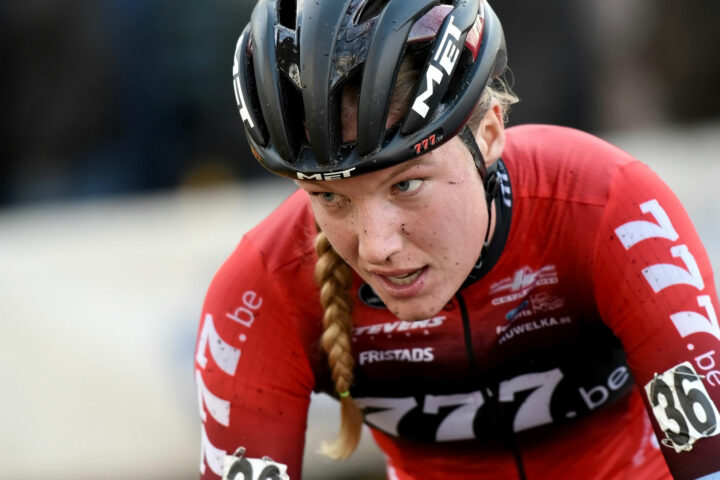Coach Grant Holicky explains how athletes can better manage anxiety through visualization, routine, and reframing.
Video Transcript
Chris Case 00:00
Hey, everyone, welcome to Fast Talk Laboratories, I’m Chris Case, this is Grant Holicky of Forever Endurance, and we’re talking today about race-day anxiety.
Grant Holicky 00:08
Yeah, we all have race-day anxiety or preparation anxiety before that race-day, what we want to give you today is some real-world ways to deal with it, to reframe it, and to use it to our advantage when we’re getting ready for that race or that training.
Chris Case 00:31
Welcome to Fast Talk Laboratories, your source for the science of endurance performance.
What Is Anxiety and Why Do Humans Have It?
Chris Case 00:41
I think it’s worth setting the stage here with a little definition, what actually is anxiety? Why do humans have it?
Grant Holicky 00:50
Well, basically, any time we are going to be stressed, your body kicks into kind of a fight or flight, right? So much of the anxiety that you feel is a product of adrenaline in the body, excitement in the body, and that’s one of the things we’re going to talk about today is actually reframing anxiety. We almost want to come away from that word, right? Anxiety means that we’re very, very much focused on the future and not on the present, anxiety is what’s the result going to be? How’s this going to turn out? What’s going to happen out there? And there’s nothing you can do about that before the race.
Chris Case 01:25
Sure.
Grant Holicky 01:25
So, we almost want to reframe this say and take those feelings that are coming on the start line, or when you’re thinking about the start line or any of those things, let’s talk that be less about anxiety and have that more about excitement, more about adrenaline, and I think we’ve all had that feeling on the start line, or I tend to like to present it this way, lay in bed, close your eyes, think about the start of that race, or think about that event, and what comes and the butterflies tend to come in the stomach and that little light feeling in the hands and maybe your mouth gets dry, all those things happen. That’s your body reacting in a way that says, okay, I gotta get all my energy out, because I got to be able to perform right now, and so it’s going to take all that energy away from all the things that it doesn’t think it needs. That’s why you get those feelings because all the blood goes from your stomach, I don’t need to digest anything anymore, we need to pump oxygen to the muscles. So, that’s where some of that comes from, that’s the physical reaction. One of the things that I like to use, or I like to teach athletes to use is the idea of visualization. Give yourself with some regularity, put yourself in a dark room, close your eyes, and visualize the start of a race and see how real you can make it, you know, for us with cross races, we can visualize the smell of the food that is usually at a venue, right? The dirt or the smell of the rain or the other athletes, one of my favorite things to do is visualize people like you on the start line, people that I’m used to racing against those familiar faces, those faces that breed the competition, right? These are the people that I want to compete against.
Chris Case 03:09
You’re putting yourself in that place at that moment.
Grant Holicky 03:11
It’s really important to understand that all of your senses drive that moment, what are your hands feel like on the hoods? What do you smell? What’s the sunlight feel like? All of those other aspects, because as real as we can make it, our mind has a little bit of trouble understanding the difference between a visualization and reality, it remembers both in a similar way, they’re both used or comprehended in the same part of your brain. So, the more we put ourselves there, and then we react to it the way we want to react to it on the start line, the more that becomes a habit, the more that becomes something that we can control.
Getting From a Poor Reaction to a Good Reaction
Chris Case 03:52
So, that brings up a very important question, how do you get from a poor reaction to a good reaction?
Grant Holicky 03:59
Right. This is what I was about to share what I’ve done personally, and in some of this, let’s take a slight step back, some of this is very determinant by something called Eyes Off, and Eyes Off is developed by Yuri Hannon, and what it is called the individual zone of optimal functioning, and everybody’s going to have their own individual zone of optimal functioning. Mine is being happy, I perform best in a joyous place, and that’s a joyous place for me. Some people perform really best when they’re angry.
Chris Case 04:29
Right.
Changing Your Relationship With Stress
Grant Holicky 04:30
So, this is why we don’t necessarily talk about positive self-talk, because your self-talk might be negative, you suck Chris, Go! And mine might be very, very positive, you’re incredible Grant, way to go! Either one of those is really good, but you need to understand what yours is. So, when you start to think back on your best past performances, what was the state of mind going into those races? And that’s the way you can start to develop what your individual zone of optimal functioning is. Mine is joy. So, what I tend to do is I visualize the start of that race and make it as real as possible, and that’s why the people around me are so important. I race for those relationships. So, I tend to put myself on the line, let all that adrenaline come, all that stress come, and then think about something that makes me laugh, and generally, it’s the people I raced with or against, right? And you’ve been there, we crack jokes started those lines, it’s very relaxed, and it’s a very family feel there, and it doesn’t matter whether that’s a local Boulder race or a nationals race, I know there’s going to be people there that I know, and so I think of something that makes it fun, makes it joyous for me, and I’ve started to over the years change that relationship with the stress and make it about excitement, and passion.
Chris Case 05:48
How often before a key race or any race, would you do a visualization routine, and how long does that routine last?
Visualization Routine
Grant Holicky 05:59
I don’t think it needs to take very long, because like I said, you’re not necessarily you can and it’s a great idea to visualize the entire race, but what we’re talking about right now is, how do you deal with the beginning of the race? How do you deal with that anxiety? So, all you have to really recreate is the start line, or is that feeling 20 minutes before the start line? So, it doesn’t need to take very long, five minutes or so. So, one of the newer aspects of what we’re talking about in mental strength, which is periodization. So, maybe early in the season, we’re doing this every day, every third day, we’re doing pretty consistent visualizations, but they’re short, they’re not super, super intense, but maybe as we get closer to that competition, we’re doing it a little bit less frequently, but we’re doing more intensive sessions of that visualization so that we’re heightening the response, were more preparing ourselves for what that start lines actually going to feel like, because we’re taking more information to that visualization to, right? I have three months of training under my belt, I know more of how I’m going to feel, maybe I have a whole season of the cross, I know how competing against these people, so we can bring more of that to the line. So, it’s not something you have to do incredibly often, but what I suggest is, give yourself the best chance to make it very real. The more realistic that is, and that’s why all the senses are important, the more your body is going to create that natural response, and then you learn how to reframe that response to move forward.
Chris Case 07:25
Sure.
Chris Case 07:26
You’ve mentioned cross multiple times, I feel like the race-day anxiety you feel about cross has a lot to do with that start.
Grant Holicky 07:34
Yeah.
Chris Case 07:35
Same with maybe short track mountain biking, maybe a crit, not so much in a road race. So, what would you recommend somebody visualize when they’re preparing for a road race that’s going to play out over five hours?
Grant Holicky 07:48
So, maybe the road race, what you’re spending time visualizing is major pieces of the course, like what am I going to do? And how am I going to react in the crux of the course, right? When a competitor attacks a climb, how do I intend to respond? Creating plans for how you’re going to do, what’s my job on my team on the road race? Am I going to be driving the pace for the first three hours? Am I going to get in that early break? Visualizing how some of those circumstances may play out is really, really important. One of the things that have been really interesting in this field is that we’ve kind of learned the top athletes don’t just visualize the good, then visualize the bad. So, how are you going to react when you miss that final feed? How are you going to react if you get a mechanical you have to go back to the car? How are you gonna react to these not great things? One of the things that Bob Bowman, who is Michael Phelps is coach, Michael Phelps the multiple-time gold medal swimmer learned after the fact was that Michael Phelps used to visualize swimming without his goggles. So, when that 200-butterfly came at the Olympics, and he lost his goggles, he knew what was going to come, he knew how he was going to react because he’d already played through this in his mind. So, I think with visualization, so many athletes tend to see it as focus on the positives, focus on the negatives, too, and create a way that you have a plan to react to that. Across the board, the more prepared we feel, the better off we’re going to be in all those environments.
Chris Case 09:17
You mentioned this briefly, one last thing on visualization, dark room, quiet room, is that what you would say is the ideal setting for this type of activity?
Grant Holicky 09:27
Certainly, at first, I think the fewer distractions from the outside, the better off you’re going to be to recreate that feeling. Once you’ve spent more time with it, it’s kind of like meditation, right? To be successful in meditation in the beginning, it’s very much about kind of removing the outside influences from what you’re feeling. As you get better at it, you’ll start to realize you can do it anywhere, anytime. I’ve gotten to the point where I feel like I can create that race to anxiety at a stoplight, and not just subconsciously, I can make it happen. I think that because is a really important piece of what we’re talking about here. Can the athlete make those reactions come? Because if they’re coming, you’re in control, then you can do something about it. If they’re constantly creeping up from your subconscious, you’re going to constantly be out of control, and you’re reacting.
Chris Case 10:16
Sure.
Grant Holicky 10:17
And that puts you in a tough spot.
Chris Case 10:19
Very good. One thing that we didn’t talk about at the start was we maybe described it, but not in the terms that you might hear in the literature, which is this reframing.
Grant Holicky 10:31
Yeah.
Chris Case 10:31
Tell us a little bit about what reframing is and how it’s done.
Reframing Race-Day Anxiety
Grant Holicky 10:35
So, anytime you have a reaction, or anytime you have an emotional response, you have an emotional response that’s subconscious, it’s very quick, it’s not thought out. A lot of the research in simple emotional response talks about simply thinking about what your response is the precursor being able to change that response. So, somebody who has a really, really hot temper, quick temper, simply stopping for a fraction of a second saying, why am I reacting this way? So, what we’re trying to do is react and take that objective step back, we’re almost trying to play you to me, right? If you’re looking at me going, “Grant why are you freaking out?” You’re gonna try to do that with yourself a little bit, take that step back and say, “Grant, why am I freaking out?” And then start to understand the reality of the situation, and how can we change what we’re coming at? I’m really wound up, why are you really wound up? I’m really wound up because I want to win. Why do you want to win? Because I feel like I can win. Oh, well, that’s a reframing, that’s a positive now. It’s not oh, no, I might lose, it’s, hey, I’m in a place where I could go win, and if we can reframe those things to a positive, reframe those things to something that’s going to push us along, we’re gonna have a lot more success.
Chris Case 11:55
Great. I think this goes along with this concept of defining your why, and defining the purpose for why you’re doing this, why you’re on that start line, what you are gaining from the sport that you love to do.
External and Internal Motivation
Grant Holicky 12:11
Yeah, and I think this is so important when you talk with your coach, or you talk with yourself about your goals as an athlete. Why am I here? And one of the things that I’ve fought through the years with so many athletes is that honesty, you know, so many athletes, either to themselves or to their coach, they say what they think they’re supposed to feel, right? And, you know, for so many of us as Master’s athletes, if I took us in a dark room, and I said, Why do you do this? One of the things at the top of the list is fun. This brings us back to something we talked about a lot, which is external and internal motivation, right? What are you driven by? So, what’s driving you to that line? We talk to so many athletes, and there’s qualitative studies that have interviewed Olympic athletes in some 70% of those Olympic athletes still point to fun, as the main reason that they’re out there performing are out there training. So, you need to kind of come back as an athlete to why you’re in the arena? what are you doing and why are you putting yourself there? And if you find that, that thing for you is fun, well, then that needs to stay at the top of the list, right? And that needs to be the thing that drives you, you need to make sure that we’re not getting so into the numbers or into the results, that our motivation is being pulled towards that extrinsic place, that it’s coaches or our peers, or the reward that is driving us, right? Keep it from the inside.
Chris Case 13:36
Yeah, you don’t what to, I think what must be emphasized is you don’t want to attach your value as a person with a result, the end of the day.
Not Defining Yourself by Your Sport
Grant Holicky 13:45
Right. It’s you can’t define yourself by your sport, your sport can define some of who you are, right? But you can’t be deriving your happiness, your success, or any of that thing, that stuff, even if you’re professional, right? Because we wouldn’t want you to derive your happiness from your job, and as a professional, that’s the exact same thing. There are so many other aspects of our life, when we talk about mental strength, we want to approach this holistically. We’re looking at the whole athlete, we want to look at that whole person, what drives that person? And then how are we building sport around that for the betterment of the person?
Chris Case 14:25
Yeah, I mean, just think about cycling and how many times a person wins. If you derive your happiness as a human being from the times you won versus the times you lost, you’d be a very unhappy person.
Grant Holicky 14:39
We see that with many professional athletes. One of the favorite things that I’ll talk about is, you remember there was a time where Mark Cavendish was the preeminent sprinter on the planet, he would win everything, but he didn’t win everything, right? We would go to every sprint, and he’d still only probably 50-60% of the sprint.
Chris Case 14:58
If that,
Grant Holicky 14:58
If that, he was one of the best ever at that time, the same thing with Cipollini at that time, right?
Building a Race-Day Routine
Chris Case 15:04
Right.
Grant Holicky 15:04
Because there are a million things that can go wrong that are outside of your control, and we talk to athletes about this all the time control what you can control, this is a great way to deal with race-day nerves or the excitement, control what you can control, don’t worry about anything else. It’s not even actively don’t worry about those other things, focus on the things that are within your control, and this brings us to a great way to deal with it, and that’s routine.
Routine vs. Superstition
Chris Case 15:32
Yes.
Grant Holicky 15:32
And I’ll talk so much with athletes prior to a race about what is your race-day routine, and there’s a very big difference between routine and superstition. Superstition says, If I do this sequence in the right way, something out there is going to make my race good.
Chris Case 15:50
Magical.
Grant Holicky 15:51
Magical.
Chris Case 15:51
Magical pair of socks or jerseys.
Grant Holicky 15:54
Right. I remember this vividly when I was playing baseball when you live in a sport where you’re incredibly good when you’re successful 1/3 of the time, right? Luck and superstition are naturally part of the sport because you just never know, right? But with cycling, we want to control those things that we can control. So, when do I eat my big meal? When do I make sure that I’m in my skin suit? When have I done my warm-up? When do I go to registration? When do all those things happen? And as much as possible have a routine that’s going to be similar every single time.
Chris Case 16:28
Right, predictable.
Grant Holicky 16:29
Sure, right. That way, if something comes up, you can adjust, you make the little changes in your routine and you move forward from that point, maybe registrations not open yet, you have to push that back, what do I flip flop, but I always have that mental list of the things that need to get done, and you can take comfort from that. If it’s a really, really individual thing, you know, I talked about this with swimmers a lot, or maybe time trials a lot, you know, what’s my goal? I’m going to sit back maybe 10-15 minutes before, focus in on the big picture, this is what I want the whole thing to look like, and then maybe I derived just a couple cue words out of that, just a couple things that I’m going to say to myself the whole time, rpm, you know, cadence high, focus, you know, and whatever those words are, watch that guy, don’t let Chris drop you, whatever that is, and you know, that becomes a really simplified version, so now they’re in the race, trying to think about 8000 things at once, part of your routine is thinking about all 1000 of those things, boil them down to the simple and then move forward from there.
Chris Case 17:37
I think one thing to mention about routine is you can fall off the routine and fall into superstition, which we don’t want, you can also become so rigid with a routine that if you get thrown off that routine, that anxiety comes back. So, you have to have some amount of flexibility, and I think like you said, if you think through all of those scenarios beforehand, you do some visualization of the positives and the negatives then you know how to react and work your way through those types of situations.
Grant Holicky 18:09
Absolutely. Like what are you going to do if you get there and your tires flat? What are you going to do if you get there and registrations close? What are you going to do if you get to a cross course and there’s no pre-ride? All of these pieces, and that’s worth that visualization and worth that mental prep, and over time your routine will change, right? As I go to the start line with a wife and two kids, my routine is far different now than it was when I went to the start line alone. So, I may have to be okay with a 15- minute warm-up or no warm-up.
Chris Case 18:41
No warm-up.
Grant Holicky 18:42
Right. Understanding how do I react? How do I make my race go well? It may mean I need to start a little slower, I don’t attack on the first lap, I don’t do those things, but how we build out that routine and how we understand and then work with our circumstances become really important to mitigating anxiety and maximizing excitement.
Chris Case 19:03
Absolutely. Well, anxiety, we all feel it, we’ve all felt it, we’re going to feel it again. There are ways to react to it that can crush your hopes on race day.
Grant Holicky 19:15
Yeah, absolutely.
Chris Case 19:15
And there are ways you can react to it that will actually help you, benefit you on race day. So, thank you again to Grant Holicky, from Forever Endurance for sharing your expertise on this subject. If you want to learn more about anxiety and race-day prep, or if you have questions for Grant or me, check out the forum on forums.fasttalklabs.com.
Grant Holicky 19:37
Look forward to more mental strength content, more mental skills content, Chris and I are going to look forward to putting more of that out for you.
Chris Case 19:44
Thanks again for joining us at Fast Talk Laboratories.





